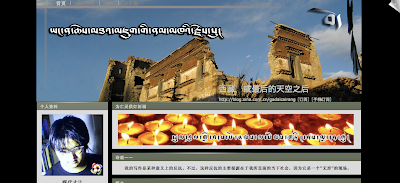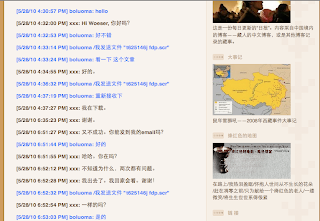High Peaks Pure Earth has translated a poem originally written in Chinese by a Tibetan university student on March 10, 2010 and posted on his TibetCul blog on March 19, 2010. According to the blog, the student calls himself Huare Yinggya, meaning he is from Huare, an area in Amdo in today's Gansu province.
Although his blog is still active, this poem has since been removed from TibetCul, the original link http://duoyingjia1987.tibetcul.com/84737.html does not work.
The poem is an interesting meditation on discovering Tibetan Buddhism at university and closely related to Tibetan identity. Hence this poem fits well into the loose series of postings on High Peaks Pure Earth titled "I Am Tibetan".
As the original post is no longer available, the original Chinese is copied below the English translation.
Screenshot of Huare Yinggya's Blog
Thoughts on Tibetan Buddhism by a university student who
has studied Tibetan since elementary school and is about to graduate
By Huare Yinggya
It wasn’t until university that I started to systematically study our Tibetan nationality's broad and deep traditional culture;
It wasn’t until university that following the teachers’ hard work started guiding us to an ocean of knowledge;
It wasn’t until university that the extraordinary ambition of youth started to have free rein;
It wasn’t until university that I started entering the scripture halls of Buddhist learning.
It wasn’t until university that I knew such different people are living in the world;
It wasn’t until university that I knew wonderful mysteries are aglow within science;
It wasn’t until university that I knew the place for exerting myself;
It wasn’t until university that I knew the warm sense of home when wandering.
It wasn’t until university that I felt spiritual power is needed in life;
It wasn’t until university that I felt the guide of interest is needed in study;
It wasn’t until university that I felt mutual tolerance is needed in love;
It wasn’t until university that I felt considering the true meaning of life is needed in time.
It wasn’t until university that I loved to read books that burst with wisdom;
It wasn’t until university that unawares I studied Buddhist scriptures;
It wasn’t until university that I fell madly obsessed into the Buddhist ocean;
It wasn’t until university that I sighed with my own boundless happiness.
It wasn’t until university that I considered the ocean of suffering taught in Buddhism;
It wasn’t until university that I considered the connections between Buddhism and life;
It wasn’t until university that discovered I am full of courage;
It wasn’t until university that I studied the original forms of Buddhism.
It wasn’t until university that I concluded Buddhism is not a shallow religion;
It wasn’t until university that I concluded Buddhism is a high philosophy;
It wasn’t until university that I experienced Buddhism gives us a lifetime of happiness;
It wasn’t until university that I could say Buddhism is the world’s highest teaching.
It wasn’t until university that I thanked our ancestors for leaving us the best teaching;
It wasn’t until university that a devout faith arose for the lama in my hometown;
It wasn’t until university that a responsibility was fostered to struggle for the people;
It wasn’t until university that I started chanting Buddhist mantras.
It wasn’t until university that I lamented the rarity of the soul of life;
It wasn’t until university that I discovered helping others is life’s greatest happiness;
It wasn’t until university that I understood the philosophy of a water drop entering the ocean;
It wasn’t until university that it was affirmed the joy of studying Buddhism comes only when caring for others.
I have graduated into the bosom of my alma mater;
I have graduated and it is tinged with slight tears;
I have graduated and hope you will all walk my path;
I have graduated and await all your eternal happiness.
I have graduated and am but one member of society;
I have graduated and am still a child of my alma mater;
I have graduated and am still as compulsive;
I have graduated because of pride in my nationality.
I have graduated and blood beats through my bosom;
I have graduated and I consolidate Buddhist thoughts;
I have graduated and undertake a holy mission;
I have graduated and I preach the poetry of Buddhism.
Dotsang Yinggya from Huare, poetry student, written in the Chengdu branch office of TibetCul
March 10, 2010
一个从小学习藏文现在即将毕业的大学生对藏传佛教的感悟
到了大学才开始系统的学习我们藏民族博大深渊的传统文化
到了大学才开始跟着老师辛勤的教导漫漫的走向知识的海洋
到了大学才开始挥洒年轻人非凡的雄心壮志
到了大学才开始进入佛学的典堂
到了大学才知道世界上生活着五彩的异人
到了大学才知道科学中焕发着美妙的奥秘
到了大学才知道自己还处在拼搏的行列
到了大学才知道漂泊中感觉那家乡的温馨
到了大学才感觉生活中需要精神的动力
到了大学才感觉学习中需要兴趣的引导
到了大学才感觉爱情中需要彼此的宽容
到了大学才感觉时光中需要思考生命的真
到了大学才翻阅爱心中爆发的智慧的著作
到了大学才无意中学习佛教的经典
到了大学才疯狂地痴迷到佛学的海洋
到了大学才感叹到自己无尽的快乐
到了大学才思考佛学中教授的苦难的大海
到了大学才思考佛学和生活的彼此关系
到了大学才发觉自己满腹的勇气
到了大学才研究佛学的原始面貌
到了大学才得出佛学不只是浅薄的宗教
到了大学才得出佛学是一种高层次的哲学
到了大学才体会佛学给我们终生的快乐
到了大学才赶说佛学是世界上至高的教育
到了大学才感谢祖先给我们最好的教育
到了大学才虔诚的信仰起家乡的活佛
到了大学才树起为民族奋斗的义务
到了大学才开始念诵起奇特的佛号
到了大学才感叹生命是无常的难得的灵魂
到了大学才明白生活中助人是最大的快乐
到了大学才理解一滴水流进大海的哲理
到了大学才断言有爱心才能进佛学的快乐
毕业了在这个母校的怀中
毕业了夹杂着淡淡的泪花
毕业了希你们走我的道路
毕业了期你们永久的快乐
毕业了我只是社会的一员
毕业了我仍是母校的孩子
毕业了我还是那样的冲动
毕业了就因为民族的骄傲
毕业了我怀着满腔的热血
毕业了我凝固佛学的思维
毕业了我扛起神圣的使命
毕业了我宣讲佛学的诗歌
2010.3.10 华锐娃朵仓英加学诗于藏人文化网成都分公司办公室












































